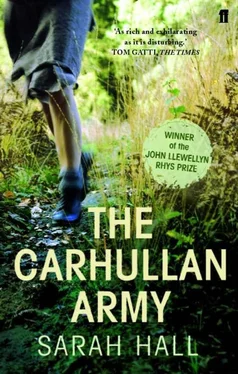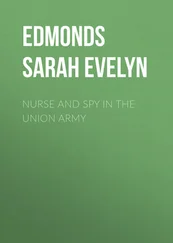Sarah Hall - The Carhullan Army
Здесь есть возможность читать онлайн «Sarah Hall - The Carhullan Army» весь текст электронной книги совершенно бесплатно (целиком полную версию без сокращений). В некоторых случаях можно слушать аудио, скачать через торрент в формате fb2 и присутствует краткое содержание. Год выпуска: 2008, Издательство: Faber and Faber, Жанр: Современная проза, на английском языке. Описание произведения, (предисловие) а так же отзывы посетителей доступны на портале библиотеки ЛибКат.
- Название:The Carhullan Army
- Автор:
- Издательство:Faber and Faber
- Жанр:
- Год:2008
- ISBN:нет данных
- Рейтинг книги:4 / 5. Голосов: 1
-
Избранное:Добавить в избранное
- Отзывы:
-
Ваша оценка:
- 80
- 1
- 2
- 3
- 4
- 5
The Carhullan Army: краткое содержание, описание и аннотация
Предлагаем к чтению аннотацию, описание, краткое содержание или предисловие (зависит от того, что написал сам автор книги «The Carhullan Army»). Если вы не нашли необходимую информацию о книге — напишите в комментариях, мы постараемся отыскать её.
The Carhullan Army — читать онлайн бесплатно полную книгу (весь текст) целиком
Ниже представлен текст книги, разбитый по страницам. Система сохранения места последней прочитанной страницы, позволяет с удобством читать онлайн бесплатно книгу «The Carhullan Army», без необходимости каждый раз заново искать на чём Вы остановились. Поставьте закладку, и сможете в любой момент перейти на страницу, на которой закончили чтение.
Интервал:
Закладка:
The fell was covered with stiff gingery grass and droves of heather. Here and there my foot sank into small brackish wells, then sucked back out covered in mud. Every step was harder than it should have been. The smell of the grassland and peat was all around; open and bloody, burnt and aromatic. I’d been keeping the dry-stone wall I thought signified Carhullan’s land on my right as I climbed, and it had led me through bogs and swales, up over outcrops of rock and loose bluffs.
My father had told me as a child that it was the Vikings who originally built Cumbria’s dry-stone walls, and they had been more determined with their corridors than even the Romans. Here, now, I could believe it. In places the structures ran almost vertically upwards; each stone held tightly on to those surrounding it. They were modest, impossible feats of engineering. Over the years, while the district was occupied, they had been repaired and tended by farmers, shepherds, and hired hands, but some sections must have dated back a thousand years. A couple of times on the climb I wondered whether I’d been following the wrong wall, whether I might end up on the broad windy summits of the range, lost as the night came in. Now and then I thought I could hear the bleating of sheep, Carhullan’s hefted flocks perhaps, but each time the sound was fainter, and further away.
Looking ahead I judged that there was perhaps just one final hill to scale and then I would be able to see the farm and its outer fields. I decided to stop and rest, and think about what I would say when I arrived. Suddenly it seemed stupid that I had not considered a speech, some meaningful words of introduction that would secure my welcome. I shouldered out of my rucksack, lay it down on the moor, and sat on a broken lip in the wall. I had gained considerable altitude. Below me was the tapering valley, and beyond it, in the next dale, I could see the sleek corner of Blackrigg reservoir.
All around, the wind stroked the tawny grassland; the veld darkened and lightened in waves as the air coursed over its surface. There were belts of dark yellow underneath the parted clouds, the oblique late light of autumn evening. I could smell gorse, blossoming sweetly against its spines. After the confinement and industrial stink of the town, the factory metals, human secretions, the soots and carbons of the refinery, this harsh and fragrant expanse was invigorating. It was the smell of nature, untouched and original, exempt from interference. For all my weariness, it made me feel a little more alive, both human and feral together, and somehow redeemed from the past.
I would tell Jackie and Vee the truth. I’d say nothing more than I felt. That I believed in what they were doing, now more than ever. That I felt there was nothing for me in the society I’d left behind. I couldn’t condone it. I couldn’t live within it.
Suddenly there was a burst of movement at my side. Three deer bolted past, almost silently, their heads held erect, their hides the colour of the surrounding moor, white rumps flashing. The hooves became audible on the wind for a few seconds, a dull thudding on the ground, and then they were gone over the brow of the hill. Their swiftness was astonishing. They had broken cover only because of their speed, as if pieces of the ground had come loose in a rapid landslide. A few seconds later I heard the hollow barking of a stag behind me, and then it flowed past after the hinds, darker and broader against the terrain, its antlers cast high, its neck thick and rough with fleece. I stood up to see if I could catch sight of it rising over the next hill but there was no sign, just patches of October light drifting across the moor. They must have heard my approach, or scented me as they grazed, I thought.
I sat back down on the wall. I wanted to take off my boots and look at my feet, expose them to the cool air. They were sore at the heels and under the toes and my socks felt as if they were sticking wetly to blisters that had already ruptured. When I’d hiked with my father this was the ritual always performed at the end of every trip. We would sit on the bumper of his car and wrench off our boots and the air would soothe our skin.
There was probably another mile still to hike, but I decided it would be better to patch any abrasions before continuing. Putting my boots back on would hurt, but it would be worse if I kept on with open sores, and I didn’t want to spend my first days at the farm limping around, seeming incapacitated and weak. The women there must have come through much hardship, having survived for so long in that place. And I was determined to match their resilience, in spirit at first, then physically.
As I leant down to unlace my boots I felt myself pitching forward off the wall as if it had given way underneath me. The ground rushed up. There was no time to get my hands down to break the fall and I landed hard on my shoulder and face. My kneecap cracked against a slab of stone. A jolt of pain shot the length of my leg and another through my mouth. For a second I lay there, stunned, my cheek sunk in the wet ground and the blond grass swaying indistinctly across my field of vision. Then everything slowly came back into focus. An inch from my eye a spider was belaying down one of the stems on a pale rope. Its legs pedalled precisely on the descent.
I drew a shallow breath and as I did so my collarbone and back protested. All the air had been knocked out of me on impact, but my lungs had been strangely airless even before I hit the ground. I fought with my diaphragm to let oxygen pass, trying to stem the panic of being winded. I couldn’t find and use my arms so I pushed against the ground with my chest, trying to raise myself. But I could not move. I was like a landed fish.
As I made an effort to get up again I heard a voice, not far away. ‘Keep her down. Lock on tight.’ I felt the pressure on my back increase. I stopped moving, and tried to say something, but it came out as nothing more than a cough. There was the gory taste of peat in my mouth and blood that ran from inside my nose. I lay still and looked into the moor grass. After a moment my lungs began to calm and fill, but my heart was hammering. In front of me the spider reached the base of the stem, cut itself free, and disappeared into the undergrowth.
‘Check the duffel,’ another voice said, closer to me this time. Curling my fingers I felt the warm skin of a hand that had both of mine pinned together behind my back, midway up my spine. There was the sound of ratching and zipping, nails scrabbling quickly between the nylon folds of my bag. I heard the soft brush of clothing as it was brought out of the rucksack, the thump of my canister as it was dropped on the ground. Then there was a pause. ‘She’s got a bastard gun. Look.’ The grip tightened on my wrists. A hand was placed on the back of my head and my face was pushed further into the damp earth. ‘Shit. Good girl, eh?’ I heard the last contents of the rucksack being turned out, the boxes of bullets being unwrapped from a bundle of T-shirts. Then the casings were rattled against the cardboard edges. ‘No. Bad girl. Ready to get her up?’
The voices were women’s. I could not tell how many were present, they were muffled and low, but I could hear that they were efficient. ‘Yes. In a minute. Lynn, go and secure the ridge.’ There was the sound of someone running. Then the hand on my head tightened into a fist. It took hold of a clump of my hair and lifted my face out of the wet earth. ‘Anyone else with you?’ The voice was louder now that my ear was out of the mud, and it was precise, leaving a small pause between each word. I moved my tongue against the roof of my mouth and my gums and spat out a mouthful of dirt. The inside of my cheek was stinging, and I knew I’d bitten it in several places. ‘No,’ I said. ‘I walked here alone. From Rith.’
Читать дальшеИнтервал:
Закладка:
Похожие книги на «The Carhullan Army»
Представляем Вашему вниманию похожие книги на «The Carhullan Army» списком для выбора. Мы отобрали схожую по названию и смыслу литературу в надежде предоставить читателям больше вариантов отыскать новые, интересные, ещё непрочитанные произведения.
Обсуждение, отзывы о книге «The Carhullan Army» и просто собственные мнения читателей. Оставьте ваши комментарии, напишите, что Вы думаете о произведении, его смысле или главных героях. Укажите что конкретно понравилось, а что нет, и почему Вы так считаете.












